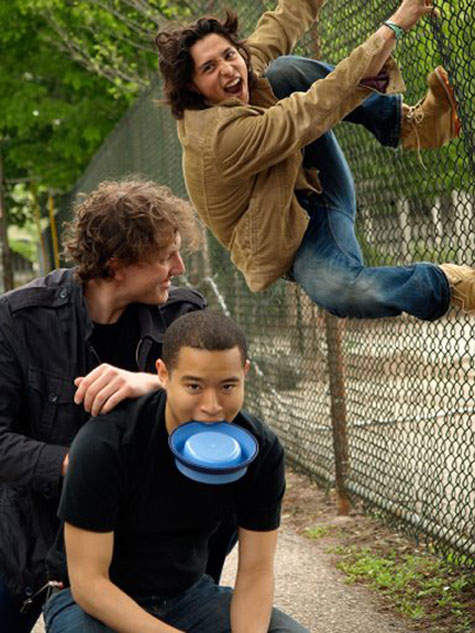This is the fifth season of the Brown/Trinity Playwrights Repertory Theater, and the three productions are quite a delightful array of comedies-in-the-works, all dealing with social survival. The plays being workshopped include an existential examination from a canine point of view; a quartet of teenagers barely treading the treacherous waters of interpersonal relationships; and an antic African-American family that makes a three-ring circus look like a rest home.
They are Dogs of the Blue Gods, by Ian Fraser, Life Science, by Anna Ziegler, and Chicken Grease Is Nasty Business, by Michael Miller. The plays are getting their final showings at Brown University's Stuart Theater through August 1 (see Theater listings for details).
DOGS OF THE BLUE GODS

WOOF! Canines cavort in Dogs of the Blue Gods.
|
Of course men are hounds and should be praised when they refrain from humping legs at cocktail parties. But that's another play. In Dogs of the Blue Gods, directed by Christopher Windom, South African playwright Ian Fraser entertains us with different eye-rolling propensities of his subspecies. The blue gods are police, and the four characters that populate this story are police dogs, trained and encouraged to be mindlessly aggressive (another matter a lot of us guys have to work on).At first we see them as four men, complaining and shuffling through stage smoke in a purgatory fashioned as an endless waiting line, occasionally hearing "Next!" shouted up ahead. That brief scene is a setup for their next stage as we see them piled up, sleeping dogs best left lying.
Their personalities vary. Rover (Will Shaw) is a puppy, excitable and impetuous. (Shaw has a great time upstaging the others, literally chewing the scenery as they talk.) His father and teacher is patiently instructive Ralph (Matt Clevy). Now that the blue gods are letting them go for faces, he makes sure Rover knows to back off quickly "so you won't get sprayed." Fang (Mark Cohen) is as aggressive as his name implies, though Cohen kindly refrains from the obvious recourse of growls.
Soon Rex (Julian Cihi), a civilian dog, is placed in their cage, confiscated from a peace demonstrator to be used as one of them. He's disoriented and upset, since he was treated gently in the home of a white god. (The dogs agree that life is harder with the black gods in their worlds of alleys and trash.) But Rex learns he'll have to put up with more than water tinged green with algae — he'll have to get used to being taken out and trained, which requires a lot of unspecified pain.
Rover likes the pain, but then everyone agrees he's twisted. Rex resists his gentle nature being wrenched into the proper shape, so we know that he won't be broken without permanent damage. When he says that he doesn't believe in biting, Ralph says that's not the sort of thing he wants his boy to hear. We can't imagine Rex ever saying, as Rover eagerly does, "If my god tells me to shout, I'll shout."
The triumph or defeat of spirit is clearly in the offing. The conclusion isn't as thematically targeted as an allegory needs, but then the effort all along in this engaging play has been more about truthfulness than instruction.